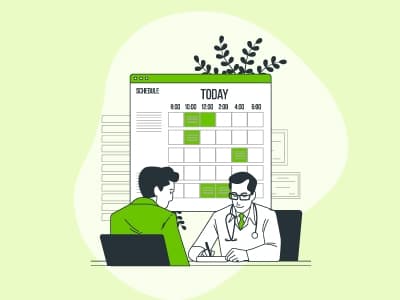
Patient appointment scheduling plays a critical role in healthcare by ensuring that both patients and providers can manage their time effectively. Efficient scheduling reduces wait times, enhances patient satisfaction, and optimizes provider resources, leading to a smoother workflow.
In addition, scheduling systems not only streamline operations but also improve the overall patient experience, allowing for better communication and access to care. This integration of technology ultimately nurtures stronger patient-provider relationships and enhances the quality of healthcare delivery.
Nearly 43% of patients now prefer scheduling appointments online, while 68% are more likely to choose practices that offer digital options to schedule, change, or cancel appointments. Additionally, 90% of millennials use mobile devices for appointment scheduling, according to HealthSoul.
This blog provides an in-depth explanation of why appointment scheduling is important in healthcare and how it impacts the overall health care scheduling system.
There are many benefits that one can get through proper planning and usage of resources. Optimal resource allocation balances staff workloads, minimizes idle time, and enhances the use of available resources, ensuring that healthcare providers are utilized effectively.
Some of the major benefits are:
Patient satisfaction and experience are critical in building trust and supporting long-term relationships between healthcare providers and patients. A positive experience encourages strategic patient engagement, leading to better health outcomes.
Here are some ways patient appointment scheduling software enhance experience and satisfaction:
Timely Access to Care
A well-organized appointment scheduling in healthcare system ensures patients can access care when they need it, especially for managing chronic conditions. Quick and easy booking options reduce delays, helping patients stay on top of their treatment plans, improving overall satisfaction.
Minimizing Errors
Efficient scheduling minimizes issues like double-booking or administrative mistakes, which can be frustrating for both patients and staff. By reducing these errors, healthcare facilities can offer a smoother, stress-free experience, building trust with patients.
Streamlined Appointment Management
Providing easy online options for cancellations, rescheduling, and self-scheduling empowers patients to manage their appointments effortlessly. This not only reduces the inconvenience of phone calls and long wait times but also allows patients to select times that best suit their schedule. Ultimately, leading to higher satisfaction and a more positive healthcare experience.

Automated reminders sent via text, email, or phone greatly improve patient attendance by reminding them of upcoming appointments, which reduces no-shows and boosts clinic efficiency. Additionally, automating the follow-up visit scheduling encourages patients to attend essential appointments, promoting continuity of care and better health outcomes.
Digital appointment reminders help lower patient no-show rates, with 54% of healthcare providers using automated systems. Practices with such systems report a significant decrease in no-show rates. Also, implementing an automated patient waitlist allows healthcare practices to quickly fill cancelled slots, ensuring that no appointment time go to waste, maximizing both patient care and practice efficiency.
Supporting Administrative Efficiency
By streamlining various administrative processes, healthcare providers can significantly enhance efficiency, allowing staff to dedicate their efforts to improving patient care. Some of the main benefits include:

Increased patient volume and efficient scheduling allows healthcare practices to see more patients in a day, improving patient turnover and directly boosting revenue without compromising care quality. Additionally, patient cancellations and no-shows can result in lost revenue ranging from $2,500 to $7,500 per month for healthcare practices.
By optimizing staff time and reducing administrative errors, scheduling systems help cut overhead costs, leading to more efficient use of resources and better financial management. Effective scheduling ensures that staff, equipment, and facilities are fully utilized, preventing underuse or overbooking, which maximizes the value of available resources.
In conclusion, an efficient patient appointment scheduling system is a vital component of modern healthcare practices. It not only improves operational efficiency by optimizing resources, reducing wait times, and managing staff shortages but also enhances the overall patient experience.
Streamlined scheduling systems contribute to fewer errors, better patient flow, and improved care continuity, leading to higher satisfaction and stronger patient-provider relationships. Also, the financial and resource benefits of effective scheduling cannot be overlooked.
By increasing patient volume, reducing overhead costs, and optimizing resource usage, healthcare practices can achieve greater profitability while maintaining high-quality care. Implementing advanced scheduling solutions is key to fostering a more efficient, patient-centered, and financially sound healthcare environment.
